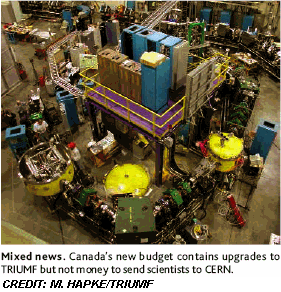|
News & Views item - March 2005 |
![]() Canada's
Minority Government Squeezes Science in its 2005 Budget. (March 4, 2005)
Canada's
Minority Government Squeezes Science in its 2005 Budget. (March 4, 2005)
With the Canadian Liberal Party's Jean Chrétien as Prime
Minister his party's promise to double Canada's research effort by 2010 and put
science at the top of its agenda was on track. Chrétien stepped down to be replaced on December 12, 2003 by
Paul Martin who, following a general election on on June 28, 2004, now leads a
minority government.
on track. Chrétien stepped down to be replaced on December 12, 2003 by
Paul Martin who, following a general election on on June 28, 2004, now leads a
minority government.
Last week that minority government brought down its first budget and the news for science -- well it could of been worse but it is a shadow of the endorsement of the Chrétien years.
Increases for the country's three granting councils have been small and Science reports that according to council chairs, the upshot "is likely to be fewer grants, smaller awards, and less support for training the next generation of scientists. Martin is finding that heading a minority government requires significant placation of ones coalition partners and he has reserved the biggest increases for retooling the military and cutting taxes. It appears to have been successful in winning over the opposition Conservative Party. Universities will get a 6% boost in payments for indirect costs associated with research while Cn$178 million will be provided over 5 years for the Vancouver-based TRI University Meson Facility (TRIUMF) but received Cn$44 million less than requested. The gap, says Director Alan Shotter of the University of Alberta, means that TRIUMF won't be able to send Canadian scientists to international facilities such as CERN, Europe's high-energy particle physics lab near Geneva, although it will continue to host visiting scientists.
Still C. Konrad Gelbke, director of the National Superconducting Cyclotron Laboratory at Michigan State University in East Lansing told Science that the Canadian government's continued investment in the lab was welcome news to foreign collaborators. "That facility is going to make significant contributions to science."